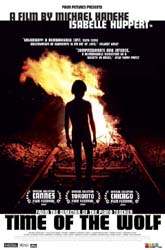 Director: Starring: Release: 25 Jun. 04
|
Time of the Wolf
BY: DAVID PERRY
Having played the reactionary sadist Michael Haneke in his
youth, making a name for himself by getting squeamish audiences to walk out
and fanboys to celebrate, the director of Benny’s Video and Funny Games is
evidently maturing into the type of assured filmmaker as Lars von Trier has
been. Though his failure-success ratio is abysmal, with Time of the Wolf,
Haneke has had three triumphs in a row, and each with its own level of
responsible wisdom. Certainly some will still remark that he’s up to his old
games with both The Piano Teacher and Time of the Wolf because they are both
fairly tough to sit through (his other success, Code Unknown, is especially
remarkable for his restraint). But he’s making points that are not
overshadowed by the film’s incessant tone, and the final impression is not
that he’s using the audience for his sadistic pleasure, but is actually
trying to get them to understand humanity at the raw levels he’s attuned to. |
|
| ©2004, David Perry, Cinema-Scene.com, 4 June 2004 | ||
